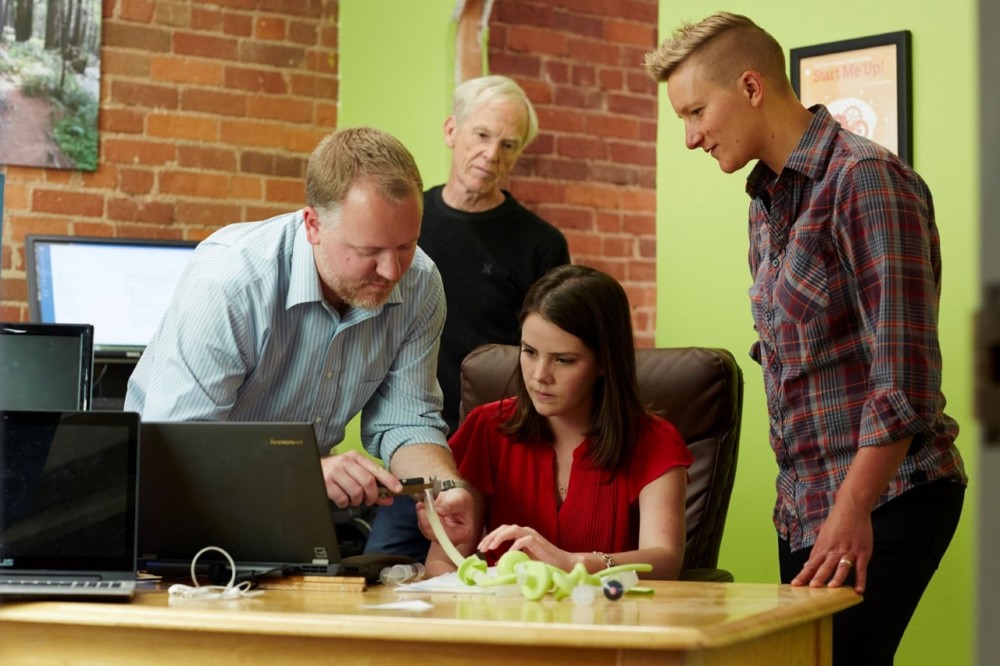Nick Wilson
The Tribune (San Luis Obispo, Calif.)
WWR Article Summary (tl;dr) As Nick Wilson reports, “Cal Poly students and a team of San Luis Obispo biomedical entrepreneurs developed the company’s innovative device, called the Jada system. The technology helps stop potentially deadly abnormal bleeding in women after birth.”
San Luis Obispo
A company that started as a Cal Poly student senior project has sold for the largest amount ever paid for a business that emerged from the university’s Center for Innovation and Entrepreneurship (CIE) HotHouse Accelerator program.
The company, originally called InPress Technologies and now Alydia Health, sold this month to the Merck-spinoff company Organon for $240 million.
Cal Poly students and a team of San Luis Obispo biomedical entrepreneurs developed the company’s innovative device, called the Jada system. The technology helps stop potentially deadly abnormal bleeding in women after birth.
The Jada system uses a gentle vacuum to stimulate uterine contraction, which helps stop the severe bleeding.
Postpartum hemorrhaging can kill mothers in matter of minutes if not properly treated, according to one of the company’s initial co-founders, Nathan Bair.
“Alydia has received the highest acquisition price of any of the Cal Poly CIE-affiliated companies to date,” said Judy Mahan, CIE’s economic development director.
How the business idea started
The idea for the Jada system was cultivated through the CIE’s HotHouse Incubator program with plans for use in the U.S. and developing countries.
CIE and its HotHouse program provide mentoring to help launch start-ups, including guidance in securing investor funding and ushering products to market.
The idea for the Jada — which uses a 41-centimeter long intrauterine device mostly made of silicone — was initiated by Cal Poly biomedical students Davis Carlin and Alex Norred as a senior project in 2011.
Carlin and Norred applied to Innovation Quest, which is a an innovation competition on campus at Cal Poly. They also were part of the first HotHouse cohort.
Jessie Becker Alexander, a former Cal Poly business administration major and HotHouse accelerator program coordinator, also partnered in the early formation of the company, along with Bair.
Davis and Norred since moved on to other jobs, as have Becker Alexander and Bair. And others took over leadership of the company as it evolved.
“We were a scrappy startup for a long time,” Becker Alexander said. “We raised money locally around SLO from advisers and some local investors as well as from angel investors in the Bay Area. … And from 2013 on, it was nose to the grindstone and definitely just working really hard to bring the technology to women who need it.”
The company got connected with the nonprofit medical technology organization Fogarty Institute for Innovation in Mountain View, and that also helped launch its success, Becker Alexander said.
The business eventually moved from SLO to Menlo Park.
The sale was initiated in March and made official in mid-June, Bair said.
“Organon’s global infrastructure and resourcing was a key factor in our confidence that they were the right strategic partner,” said Rob Binney, Alydia’s chief executive officer. “From the moment we engaged with them, we all rallied around the original vision of our founders to positively affect the outcomes of delivering mothers in (low and middle income) countries. Work has already begun between our two organizations to move forward in the achievement of this pursuit.”
A humanitarian mission
Each of the early partners has some equity in the company, along with other investors, and have benefited as shareholders, but the drive of the mission was never forgotten, Bair said.
“As soon as we took investor dollars, we knew it would be a for-profit company, but we were driven by that humanitarian mission more than anything, the entire time, and we did not lose sight of it,” Bair said.
Bair said a core mission is to reduce the number of deaths and bring the product to those in need, which the new owner will continue to do in developing countries.
“We founded the company with the mission and vision to bring the technology to the women who need it the most and are most affected by maternal mortality and morbidity due to postpartum hemorrhage,” Becker Alexander said.
In the company’s early formation at Cal Poly, Carlin and Norred collaborated with Path, a nonprofit global health organization based in Seattle.
“The concept for this device was one of multiple pitches to Path as part of our design team process, and Path ultimately asked us to go a different route,” said Carlin in an Oct. 2020 Cal Poly news article. “Alex and I felt like the idea still had a lot of potential, so we decided to pursue it separately, with Path’s permission.”
Other medical methods to stop the bleeding involving applying pressure through intrauterine balloons, which inflate.
But the Alydia device offers a safe alternative that involves drawing blood out and stimulating the contractions, Bair said.
Funding key to success
In the early days, Bair said he used some of income from another medical startup to help keep the company afloat, along with smaller investments.
Mahan, a lawyer with business expertise, helped them review documents and legal paperwork. Other experts and entrepreneurs pitched in on the medical side.
“There were a lot of hardships in those 2014 to 2017-2018 years, and I can remember lots of great highlights and lowlights,” Bair said. “We had help from amazing people.”
One of their key biomedical scientists, Amy Degenkolb, was working at Ascendo coffee shop and had expertise in the area. They recruited Degenkolb to join as a volunteer and later she became a vital paid member of the team.
Bair added: “We’d get tiny little chunks of funding all along. We didn’t have the big investment as startups often do. … Institutional investors were not interested in women’s health things. It was really, really challenging to find those investors.”
But eventually their product began to take off.
“We found lots of individuals who thought what we were doing was really important and exciting and want to be involved,” Bair said. “And increasingly, those individuals brought larger chunks of money to us. … It was a lot of work for us and especially for Jessie to raise all that money until we finally got to the larger (investment funding amounts) in 2016 or 2017.”
Asked if they are wealthy and what they’ll do next, Bair said: “It’s obviously been financially beneficial. One of the things that leaves us with is some freedom to take more risk if we want. We’d like to work in things that matter no matter how much money you make.”
Becker Alexander, whose now an Entrepreneur in Residence at the Carlsen Center for Innovation & Entrepreneurship at Sacramento State University, added: “I’m very proud of how our team really just persevered and has gotten to the point where the technology can actually be delivered and help people. It’s really, really amazing.”
___
Distributed by Tribune Content Agency, LLC.















































































































































































































































































































































































